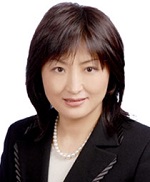Biopharma companies that have struggled to make a splash in the U.S. or European markets with their new treatments are increasingly turning to China for a reprieve.
This strategy also includes recruiting Chinese biotech startups to help get into the potentially lucrative--but slightly daunting--market.
One such startup, the Shanghai-based Zai Lab, last year licensed Bristol-Myers Squibb's ($BMY) brivanib. The drug, which failed to best Bayer/Onyx' liver cancer drug Nexavar (sorafenib) in 2013, is attractive in the region as it could come in at a much lower price than the $7,500 price tag currently asked for just one month's treatment with Nexavar--a price that isn't covered by national insurance.

Zai Lab CEO Samantha Du
"We hope to give the Chinese patients a more reasonable price," Samantha Du, founder of Zai Lab, told The Wall Street Journal.
BMS said its drug may be particularly effective in China as it is designed to treat hepatocellular carcinoma--a disease much more common there than in the West due to China's high prevalence of hepatitis infections.
But there are questions as to whether China has simply become a dumping ground for inferior drugs.
The WSJ points to the stroke drug cinepazide, which was withdrawn from Spain, Italy and France in the late 1980s and 1990s, after reports of blood disorders associated with its use. By 2010, however, it had become China's top-selling drug, according to Credit Suisse Equity Research.
Sihuan Pharmaceutical, which makes the drug, argues however that the generic cinepazide it produces is more purified than the branded version that was sold in Europe and its safety and efficacy is "recognized by Chinese authorities and patients."
But China is a much easier prospect in many ways for Big Pharma as a drug doesn't have to prove superiority over existing drugs. This is compared to the U.S., where around 90% of drug candidates are ditched during the clinical trial process.
The country still has a long wait for the latest medicines, as only 21% of drugs launched globally between 2008 and 2012 were available in China as of 2013, compared with 68% in the U.S., according to market researcher IMS Health. This includes the new hep C cures from Gilead ($GILD), which are not available in China, despite the region having one of the highest rates of hep C infection in the world.
There has also been a spate of drug safety concerns in recent years, with an ongoing scandal over improperly handled vaccines currently plaguing the China FDA.
The drug regulator has however promised to speed up approvals of new drugs for AIDS, cancer and infectious diseases, including those from foreign manufacturers, to stop the kind of health tourism route that wealthier patients are taking in order to gain access to new and curative medicines.
- read the WSJ story (sub. req.)